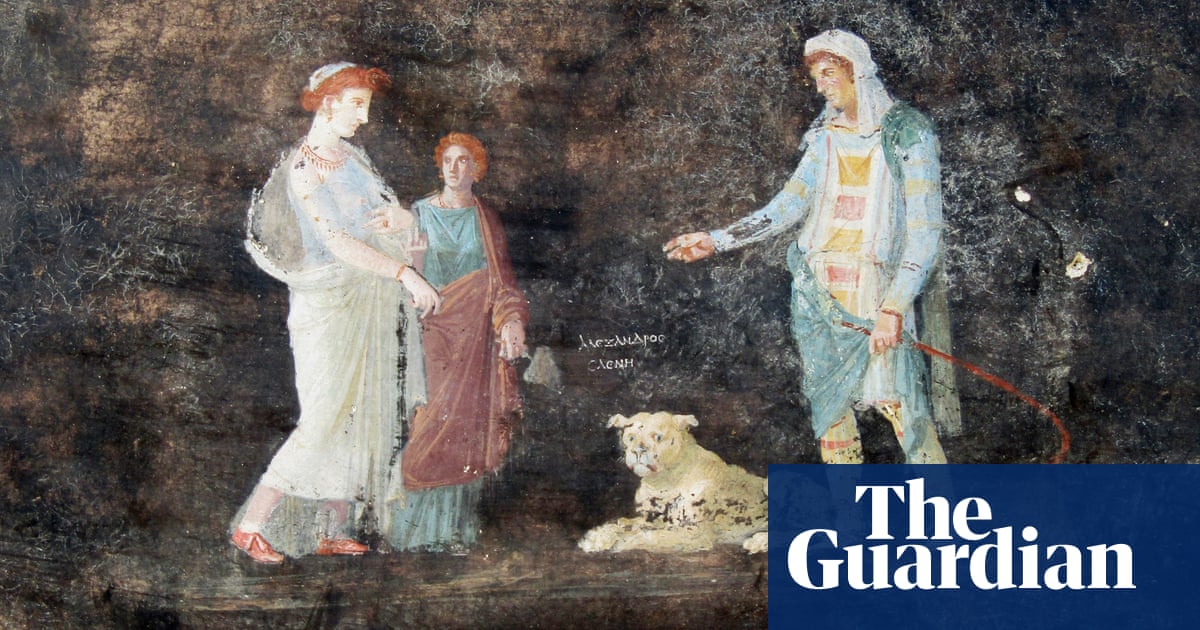
A banquet room filled with well-preserved frescoes depicting figures inspired by the Trojan War has been discovered among the ruins of Pompeii in what has been described as one of the most exciting discoveries ever made at the archaeological site in southern Italy.
The 15-metre-long and six-metre-wide chamber was found in a former private residence on the Via di Nola, the longest avenue in ancient Pompeii, during excavations in the Reggio IX area of the site.
Experts said that the “Black Room”, which was named because of the color of its walls, which may have been intended to hide the soot resulting from burning oil lamps, was “an elegant place for entertaining during joyful moments.”
Its walls are decorated with artwork depicting legendary Greek figures, including Helen of Troy meeting Paris, the Prince of Troy, for the first time. The fresco includes a dog and a Greek inscription that reads “Alexandros”, the prince's other name. According to Greek legend, the pair's escape led to the outbreak of the Trojan War in the 12th century BC.
Another fresco depicts the Greek god Apollo trying to woo the priestess Cassandra. In his efforts to seduce her, Apollo granted her the ability to predict the future, but when she rejected him he cursed her so that no one would believe her predictions. As a result, she was unable to thwart the tragic events of the battle she had predicted. After being raped during the capture of Troy, Cassandra ended up in slavery.
Gabriel Zutztregel, director of Pompeii Archaeological Park, said the mythical figures had a clear function of entertaining guests and providing talking points during the holidays.
“The legendary couples provided ideas for conversations about the past and life, apparently only of a romantic nature,” he said. “Indeed, they point to the relationship between the individual and fate: Cassandra who can see the future but no one believes her, Apollo who sides with the Trojans against the Greek invaders, but, being a god, cannot guarantee victory, Helen and Paris who, despite their love affair, are not… Politically correct, they are the cause of the war, or perhaps just an excuse.
He added: “People used to gather for dinner after sunset; The dim light of the lamps had the effect of making the images seem to move, especially after a few glasses of good Campania wine.
The artworks are of the “Third Style”, or illuminated style, dating between 15 BC and 40-50 AD.
“It is always difficult to judge quality but what we see is a high degree of attention to detail, expression and shadows,” Zutstrigel said. “This is very eye-catching, as is the business theme.”
Meanwhile, the room's sophisticated mosaic floor contains more than a million small white tiles.
After promoting the newsletter
The room opens onto a courtyard with a long staircase leading to the first floor of the property, under which a huge pile of building materials was found. On the arches of the stairs, someone has drawn a pair of gladiators in charcoal, and what the archaeologists said in their statement “appears to be a huge, stylized phallus.”
Excavations in Reggio IX, an area of the city that once hosted a cluster of houses and workshops, have yielded plenty of other finds since the start in February last year, including a house containing a cramped bakery where slaves are believed to have been imprisoned. Exploited for bread production.
The remains of three victims of the eruption of Mount Vesuvius in 79 AD were found in one of the bakery's rooms. A fixed mural resembling a pizza was also found on a wall in the entrance of the house. In December, 13 nativity-style figurines were found upright on what was likely a shelf in the hallway of a house. Archaeologists said the statues provided evidence of pagan rituals in Pompeii before Vesuvius destroyed the city.
Italian Culture Minister Gennaro Sangiuliano said, “Pompeii is truly a treasure trove that never ceases to surprise and amaze us, because every time we excavate it, we find something beautiful and important.”
The ruins of Pompeii were discovered in the 16th century, and the first excavations began in 1748. Pompeii is the second most visited archaeological site in the world.

“Travel specialist. Typical social media scholar. Friend of animals everywhere. Freelance zombie ninja. Twitter buff.”





More Stories
Macron rejects left-wing bid to appoint PM before Olympics
Dogs can smell human stress and make decisions accordingly, study says: NPR
Hamas and Fatah sign declaration to form future government as war rages in Gaza